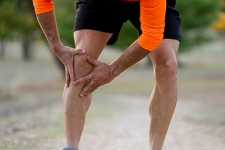An anterior cruciate ligament (ACL) tear is one of the more common knee injuries. Typically, athletes in sports, specifically basketball or football, are more likely to experience this injury. But this type of knee injury is not reserved for those in sports. As people age, old knee injuries and aging joints contribute to the risk of a tear.

What Can Cause an ACL Tear?
The cruciate ligaments are inside the knee joint. Two ligaments cross one another, with the anterior cruciate ligament in the front. Both ligaments work together to control the back-and-forth motion of the knee to give it stability. A tear in the ACL is most often triggered by activities that put stress on the knee, such as:
- Suddenly slowing down and changing directions.
- Pivoting with the foot planted.
- Landing incorrectly after a jump.
- Sudden stops that cause the ligament to hyperextend.
- Ongoing stress to the knee, causing the ligament to become overly stretched.
- A direct hit or collision to the knee, causing it to hyperextend.
Increasing the Risk for ACL Tears
As common as ACL tears are, some factors increase the risk of ACL tears such as:
- Participation in sports that require frequent and sudden stops, changing direction, jumping, and landing on one leg increases the risk of a tear.
- Previous ACL injury puts individuals at a higher risk of reinjury.
- Gender is a contributing factor, as ACL tears are more common in female athletes than male athletes.
- Age is a factor because most ACL tears occur in those ages 15 to 45.
What are the Symptoms for a Torn ACL?
Those who experience a torn ACL describe a combination of symptoms that include the following:
- Sharp pain that is related to a specific movement causing the injury.
- Immediate swelling after the injury.
- Deep pain and ache that become worse with activity.
- Instability of the knee where the knee feels like it cannot offer support or bear weight.
- Tenderness of the knee.
- Inability to straighten or bend the knee.
Usually, these symptoms present immediately after the injury, but it can take days for the symptoms to manifest fully.
Treatment and Recovery for ACL Tears
The symptoms of an ACL tear are manageable with nonsurgical methods, but the knee is not stable. This lack of stability increases the risk of future knee injuries. The ACL ligament does not have its own blood supply, making healing difficult, and because of this, some doctors recommend surgery.
A surgeon will replace the damaged ACL with a graft taken from another part of the body. After removing the ligament, the inserted graft restores the function of the knee. The surgeon has choices regarding the graft to repair the torn ACL, and there are benefits and drawbacks to each.
- A patellar tendon-bone autograft uses the patient’s patella tendon to replace the ACL. The surgeon creates tunnels by drilling through bone and passes the graft through these tunnels and secures it with screws. This type of surgical repair is very popular and has good outcomes for patients, but it can lead to pain in the knee from the harvested graft.
- A surgeon may also construct a new ACL ligament with a hamstring autograft, which is comprised of soft tissue. The use of soft tissue results in less immediate pain and a quick recovery. However, using soft tissue has a disadvantage because there is no bone-on-bone healing, meaning the knee will need to be protected longer, so the graft becomes rigid.
- Sometimes the surgeon determines the patient’s tissue is not suitable for the graft, and they opt to use donated tissue to repair the torn ACL. Using donated tissue results in a speedy recovery, but returning to athletic activities takes longer compared to the other surgical options.
Knee pain and injuries – regardless of how or when they occurred, can have huge impacts on our every day lives. If this is something you’ve been dealing with, please know that there are many treatment options available.
The orthopedic surgeons and physical therapists here at Prairie Orthopaedic, in Lincoln, Nebraska, specialize in treating all types of knee injuries – give us a call to schedule an appointment today!

